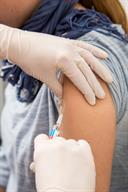ThisisPatientEngagementcontent
HPV Vaccine Information for Parents
To download the Ukraine translated version, please click the link below
 Human papillomavirus (HPV) is a common virus. It is contagious, which means that it spreads from person to person through skin-to-skin or sexual contact. There are many types of HPV viruses.
Human papillomavirus (HPV) is a common virus. It is contagious, which means that it spreads from person to person through skin-to-skin or sexual contact. There are many types of HPV viruses.Some genital HPV types may cause cancer.
Your child can get a shot, also called a vaccine, to help prevent the HPV types that can cause cancer, genital warts, or warts near the opening of the butt (anus). the shot is safe and effective. Getting the vaccine before your child is sexually active gives them the best protection from HPV through adulthood.
Have your child get the HPV vaccine before they become sexually active. The best time to get the shot is at around 11–12 years old. The vaccine may be given to children as young as 9 years old.
If your child gets the vaccine before they are 15 years old, it can be given as 2 shots, 6–12 months apart. In some cases, 3 shots are needed.
Benefits
Getting the vaccine can help prevent certain cancers. These include:Your child is less likely to get these cancers if they get the vaccine before they become sexually active.
The vaccine also prevents genital warts caused by HPV.
Risks
In rare cases, side effects and reactions have been reported. These include:Some children should not get the HPV vaccine or should wait to get it.
Ask the health care provider if your child should get the vaccine if:This information is not intended to replace advice given to you by your health care provider. Make sure you discuss any questions you have with your health care provider.
Cookies are used by this site. To decline or learn more, visit our cookie notice.
Copyright © 2025 Elsevier, its licensors, and contributors. All rights are reserved, including those for text and data mining, AI training, and similar technologies.